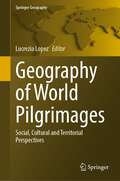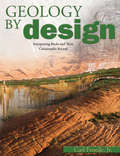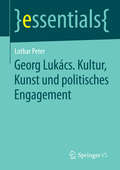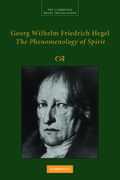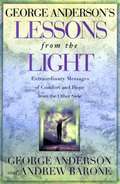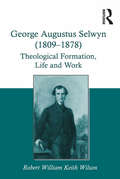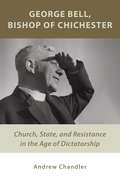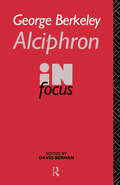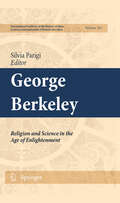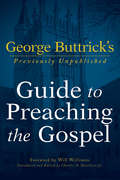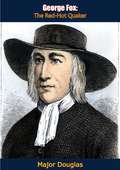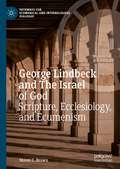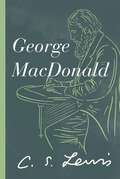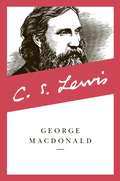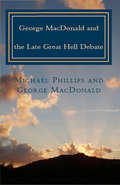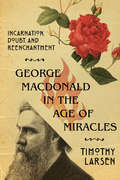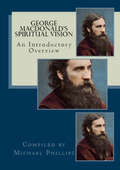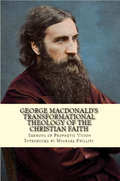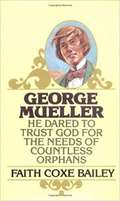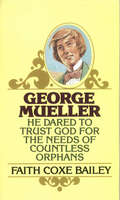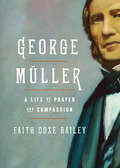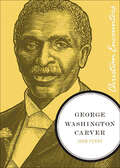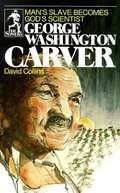- Table View
- List View
Geography of World Pilgrimages: Social, Cultural and Territorial Perspectives (Springer Geography)
by Lucrezia LopezThis book points out how pilgrimage studies rely on interdisciplinary academic interests, being always more determined by anthropological, social, cultural and economic factors. The volume gathers interdisciplinary contributions revealing different approaches and academic interests when researching pilgrimage. Finally, the proposal introduces a comparative international breath to reflect upon such complex phenomenon that since Antiquity still impregnates the history of human being across the world. As pilgrimage studies are closely related to mobility issues, how the contemporary mobile world is altering and re-signifying pilgrimage dynamics and meanings will also be discussed in detail. The term “pilgrimage” evokes key concepts deriving from different fields, all of them collected in the final glossary.The primary audience of this work are academics and researchers from different fields involved in pilgrimage studies. The work may also be useful in teaching (advanced) university courses.
Geology By Design
by Carl Froede Jr.Presents and authoritative and biblical geological time-line for high school students and adults. Includes substantial illustrations, a glossary, and an extensive reference section. Clearly explains how data from volcanic deposits, seismic activity in Earth history, and even the presence of ripple marks in rock layers support the Bible as history. From the acclaimed Creation Research Society, this technical study of rock strata, and the fossils found therein, gives a solidly scientific rationale for believing in a young earth. This advanced guide is ideal for upper-level homeschool students, college students, or anyone wishing to explore this fascinating subject in-depth and includes questions for review at the end of each chapter. Froede presents a credible geological time-line and explains the formation and existence of fossil layers in rock sediments around the world.
Georg Lukács. Kultur, Kunst und politisches Engagement (essentials)
by Lothar PeterDer Verfasser gibt einen Überblick über Leben und Werk von Georg Lukács, einem bedeutenden Philosophen und Kulturtheoretiker des 20. Jahrhunderts. Im Mittelpunkt stehen die Expressionismus-Auffassung, die Theorie des literarischen Realismus und die große Ästhetik von Lukács. Berücksichtigt wird auch die Kritik namhafter Schriftsteller und Philosophen wie Bloch, Brecht, Seghers und Adorno an seinem Werk. Dabei spielen die Zusammenhänge zwischen marxistischem Denken, Kultur und politischen Engagement eine wesentliche Rolle.
Georg Wilhelm Friedrich Hegel: The Phenomenology of Spirit (Cambridge Hegel Translations)
by Michael Baur Georg Wilhelm Friedrich Hegel Terry PinkardHegel's Phenomenology of Spirit (1807) is one of the most influential texts in the history of modern philosophy. In it, Hegel proposed an arresting and novel picture of the relation of mind to world and of people to each other. Like Kant before him, Hegel offered up a systematic account of the nature of knowledge, the influence of society and history on claims to knowledge, and the social character of human agency itself. A bold new understanding of what, after Hegel, came to be called 'subjectivity' arose from this work, and it was instrumental in the formation of later philosophies, such as existentialism, Marxism, and American pragmatism, each of which reacted to Hegel's radical claims in different ways. This edition offers a new translation, an introduction, and glossaries to assist readers' understanding of this central text, and will be essential for scholars and students of Hegel.
George Anderson's Lessons from the Light: Extraordinary Messages of Comfort and Hope from the Other Side
by George Anderson Andrew BaroneThe author conducts meetings with people who have passed over into the light at the request of families and allows them to record and make transcripts of conversations. These are present in the book as well as information the author has gained about the "light."
George Augustus Selwyn (1809-1878): Theological Formation, Life and Work
by Robert William WilsonThe conventional portrayal of George Augustus Selwyn, the first Anglican bishop of New Zealand, focuses upon his significance as a missionary bishop who pioneered synodical government in New Zealand and acted as a mediator between settlers and Maori. George Augustus Selwyn (1809-1878) focuses on Selwyn’s theological formation, which places him in the context of the world of traditional high churchmanship, rather than the Oxford Movement narrowly conceived. It argues that his distinctiveness lay in the way in which he was able to transplant his vision of Anglicanism to the colonial context. Making use of Selwyn’s personal correspondence and papers, as well as his unpublished sermons, the book analyses his theological formation, his missionary policy, his role within the formation of the colonial episcopate, his attitude to conciliar authority and his impact upon the diocesan revival in England. The study places Selwyn alongside other likeminded high churchmen who shaped the framework for the transformation of Anglicanism from State Church to worldwide communion in the nineteenth century.
George Bell, Bishop of Chichester: Church, State, and Resistance in the Age of Dictatorship (The\selected Letters And Papers Of George Bell, Bishop Of Chichester Ser.)
by Andrew ChandlerThe story of a significant British church leader who fought for justice and freedom during World War IIIt was to George Bell, an English bishop, that Dietrich Bonhoeffer sent his last words before he was executed at the Flossenbürg concentration camp in April 1945. Why he did so becomes clear from Andrew Chandler's new biography of George Kennedy Allen Bell (1883–1958).As he traces the arc of Bell's life, Chandler reshapes our perspective on Bonhoeffer's life and times. In addition to serving as bishop of Chichester, Bell was an internationalist and ecumenical leader, one of the great Christian humanists of the twentieth century, a tenacious critic of the obliteration bombing of enemy cities during World War II, and a key ally of those who struggled for years to resist Hitler in Germany itself.This inspiring biography raises important questions that still haunt the moral imagination today: When should the word of protest be spoken? When should nations go to war, and how should they fight? What are our obligations to the victims of dictators and international conflict?
George Bell, Bishop of Chichester: Church, State, and Resistance in the Age of Dictatorship (The\selected Letters And Papers Of George Bell, Bishop Of Chichester Ser.)
by Andrew ChandlerThe story of a significant British church leader who fought for justice and freedom during World War IIIt was to George Bell, an English bishop, that Dietrich Bonhoeffer sent his last words before he was executed at the Flossenbürg concentration camp in April 1945. Why he did so becomes clear from Andrew Chandler's new biography of George Kennedy Allen Bell (1883–1958).As he traces the arc of Bell's life, Chandler reshapes our perspective on Bonhoeffer's life and times. In addition to serving as bishop of Chichester, Bell was an internationalist and ecumenical leader, one of the great Christian humanists of the twentieth century, a tenacious critic of the obliteration bombing of enemy cities during World War II, and a key ally of those who struggled for years to resist Hitler in Germany itself.This inspiring biography raises important questions that still haunt the moral imagination today: When should the word of protest be spoken? When should nations go to war, and how should they fight? What are our obligations to the victims of dictators and international conflict?
George Berkeley Alciphron in Focus (Philosophers in Focus)
by David BermanAlciphron, or the Minute Philosopher (1732) is Berkeley's main work of philosophical theology and a crucial source of his views on meaning and language. This edition contains the four most important dialogues and a selection of critical essays and commentaries reflecting the response of such writers as Hutcheson, Mill and Antony Flew. The only single edition currently in print, it argues that Alciphron has a more important place both in the Berkeley canon and in early modern philosophy than is generally thought.
George Berkeley: Religion and Science in the Age of Enlightenment
by Silvia ParigiGeorge Berkeley was considered "the most engaging and useful man in Ireland in the eighteenth century". This hyperbolic statement refers both to Berkeley's life and thought; in fact, he always considered himself a pioneer called to think and do new things. He was an empiricist well versed in the sciences, an amateur of the mechanical arts, as well as a metaphysician; he was the author of many completely different discoveries, as well as a very active Christian, a zealous bishop and the apostle of the Bermuda project. The essays collected in this volume, written by some leading scholars, aim to reconstruct the complexity of Berkeley's figure, without selecting "major" works, nor searching for "coherence" at any cost. They will focus on different aspects of Berkeley's thought, showing their intersections; they will explore the important contributions he gave to various scientific disciplines, as well as to the eighteenth-century philosophical and theological debate. They will highlight the wide influence that his presently most neglected or puzzling books had at the time; they will refuse any anachronistical trial of Berkeley's thought, judged from a contemporary point of view.
George Buttrick's Guide to Preaching the Gospel
by George A. Buttrick Charles N. Davidson JR,"Does the preacher now impress us as a ‘legate of the skies’? To many he is a pathetic figure, an anachronism, a stage-joke—an inoffensive little person jostled by the crowd, and wearing the expression of a startled rabbit. With one hand he holds a circular hat on a bewildered head and with the other desperately clutches an umbrella. The crowd pushes him from the sidewalk; the traffic shoots him back into the crowd. Some curse him; a few laugh; most are unaware of his existence." (George Buttrick, Lyman Beecher Lectures, 1931).Whether we need preaching has been asked for hundreds of years, long before an age of media saturation from streaming 24-hour news, entertainment, politics, and sports. This question hounded George Buttrick, one of the most profound preachers of the twentieth century and often compared with Billy Graham. Buttrick offers a compelling answer to the question, but his answer remained hidden for 40 years until now.In George Buttrick’s Guide to Preaching the Gospel, we learn why the world needs competent preachers, what the preacher must preach about, and how the preacher goes about creating the sermon with daily discipline and several practiced skills, including research, charting, outlining, writing, and performance. These writings have never been published before and were found by his grandchildren after his death. A brief biography of Buttrick introduces this master orator and professor to readers who do not know his work.
George Fox: The Red-Hot Quaker
by Major DouglasThe story of George Fox’s life suffers from two great disadvantages which the reader should always bear in mind.In the first place, the old, strange, stilted language, used by all in his day, makes it difficult for us to feel as much at home with him as we should do. We must remember that even Salvationists in our own days are tempted when they write to give up their simple, everyday language, and to wrap up their thoughts more fashionably. But those who will try to see George Fox, as he so often was to be found, praising the Lord in a stinking prison cell, will be able in spite of his strange words to grasp his glorious meaning.And then we have also to remind ourselves that he had little chance either to observe or to organize any regular and effective warfare. For over a hundred years England had been victimized by religious discussions until the very idea of real worship had been almost lost. No wonder at poor George’s perplexities when his hungry soul began to long for God, and no wonder that the great note of his whole life thereafter was so largely that of avoiding whatever others did. If he could anywhere have seen how singing processions, flags, music, open-air demonstrations could be used in the power of the Holy Ghost to the salvation of the people; and if he could have been allowed to organize accordingly, all England would have been stirred and perhaps delivered at once from the curses of formalism and spiritual death. But it may be that God only granted him light according to what it was then possible to do. He lived a prophet’s life leaving to us in these days of liberty, not a complete description of our duties, but an example of fearless, devoted service, that, alas, but few have ever attempted to follow.
George Lindbeck and The Israel of God: Scripture, Ecclesiology, and Ecumenism (Pathways for Ecumenical and Interreligious Dialogue)
by Shaun C. BrownGeorge Lindbeck lamented that his most widely read work, The Nature of Doctrine, had often been read apart from his ecumenical focus. In this book, Shaun Brown seeks to provide a corrective to misreadings of Lindbeck’s work by focusing upon his “Israelology”—his emphasis upon the church and Israel as one elect people of God. While many Christians after the Holocaust have noted the harm that Supersessionism brought to the Jews, Lindbeck focuses upon the harm that supersessionism has brought to the church. He argues the appropriation of Israelhood by the church can bring intra-Christian ecumenical benefits. This work comes in two stages. In the first stage, undertaken while he was an observer at the Second Vatican Council, Lindbeck discusses a parallel between Israel and the church. The second stage, which begins in the late 1980s and continues through the end of his career, Lindbeck describes the church as “Israel-like” or “as Israel.”
George MacDonald
by C. S. LewisUna antología de 365 días de lecturas de uno de los escritores más influyentes de todos los tiempos, George MacDonald, recopilada por el propio C. S. LewisEsta colección, compilada por el propio Lewis, presenta escritos de MacDonald, considerado como uno de los mejores escritores cristianos de los finales del XIX, principios del siglo XX y quien sirvió de influencia de grandes escritores como Lewis Carrol, WH Auden, JRR Tolkien, Walter de la Mare y en este caso C. S. Lewis.George MacDonaldAn 365-day anthology of readings from one of the most influential writers of all time, George MacDonald, compiled by C. S. Lewis himselfThis collection, compiled by Lewis himself, features writings by MacDonald, considered one of the best Christian writers of the late 19th, early 20th century and who served as an influence on great writers such as Lewis Carrol, WH Auden, JRR Tolkien, Walter de la Mare and in this case C. S. Lewis.
George MacDonald (Collected Letters Of C. S. Lewis Ser.)
by C. S. LewisIn this collection selected by C. S. Lewis are 365 selections from MacDonald's inspiring and challenging writings.
George MacDonald and the Late Great Hell Debate
by Michael Phillips George MacDonaldThe leading MacDonald scholar settles the longstanding debate about the author&’s views on hell with an in-depth analysis of his thought on the afterlife. Throughout his extensive and influential writings on Christian theology, George MacDonald only hints at his perspectives on hell, atonement, and everlasting punishment. Nowhere does he clearly state a doctrinal position on the subject. As a result, a controversy has raged for more than a century about whether or not MacDonald was a universalist. Now MacDonald scholar and biographer Michael Phillips tackles the &“great hell debate&” head on in this authoritative book. With numerous quotes from MacDonald&’s writings and his extensive knowledge of MacDonald&’s work, Phillips blows the lid off the debate by illuminating the full scope of MacDonald&’s afterlife vision. One of the most significant studies of MacDonald&’s theological perspectives ever written, this is a must-read for all serious students of George MacDonald.
George MacDonald in the Age of Miracles: Incarnation, Doubt, and Reenchantment (Hansen Lectureship Series)
by Timothy LarsenThe Bible is full of miracles. Yet how do we make sense of them today? And where might we see miracles in our own lives? In this installment of the Hansen Lectureship series, historian and theologian Timothy Larsen considers the legacy of George MacDonald, the Victorian Scottish author and minister who is best known for his pioneering fantasy literature, which influenced authors such as C. S. Lewis, J. R. R. Tolkien, G. K. Chesterton, and Madeleine L'Engle. Larsen explores how, throughout his life and writings, MacDonald sought to counteract skepticism, unbelief, naturalism, and materialism and to herald instead the reality of the miraculous, the supernatural, the wondrous, and the realm of the spirit. The Hansen Lectureship series offers accessible and insightful reflections by Wheaton College faculty members on the transformative work of the Wade Center authors.
George MacDonald's Spiritual Vision: An Introductory Overview
by George MacDonaldA leading George MacDonald scholar presents a fascinating introduction to the 19th century Scottish author&’s views on Christianity, faith, and God. The Victorian author, poet, and theologian George MacDonald inspired some of the greatest writers of the early 20th century, including C.S. Lewis, who said MacDonald&’s books were pivotal in leading him toward Christianity. While MacDonald&’s beloved fiction—including classics like Robert Falconer and At the Back of the North Wind—remain popular, his sermons and nonfiction writings on faith are less well-known. Now MacDonald scholar and biographer Michael Phillips presents a comprehensive introduction to George MacDonald&’s theological ideas. In George MacDonald&’s Spiritual Vision, Phillips provides extensive, thematically arranged quotes from the author&’s writings. This brief volume covers topics from the nature and character of God to salvation, justice and atonement.
George MacDonald's Transformational Theology of the Christian Faith: Sermons of Prophetic Vision
by George MacDonaldThis volume of the Victorian author&’s sermons presents an in-depth understanding of his views on Christian faith, edited for modern readers. Though he is best known today for his beloved fiction and fairy tales, such as the classics Robert Falconer and At the Back of the North Wind, George MacDonald was also an influential and visionary theologian. Now MacDonald scholar and biographer Michael Phillips presents a collection of the author&’s sermons, expertly edited for modern readers and accompanied by the original texts. Each selection is also introduced by Phillips&’s illuminating commentary. The sermons collected in this volume are prophetic in that &“MacDonald anticipates the perspectives of eternity, which is truly the most far-reaching kind of prophetic vision. He examines with profound insight an wisdom the eternal methods and purposes of God, and to a lesser extent even some of the potential outcomes that may lay in God&’s heart to accomplish&” (from the introduction).
George Mueller
by Faith Сохе BaileyIt began with George Mueller—rebellious, absorbed in the world and its pleasures. It became George Mueller—miraculously transformed by the power of Christ, daring to dream a dream and to trust God to bring it to pass. Discover the incredible true story of the man of faith who still inspires us today. Taking his biographical details and putting them in novel form, this short volume will stir your heart, move you to greater faith, and lead you to worship the God who answers prayer.
George Mueller (Golden Oldies)
by Faith Coxe BaileyGeorge Mueller—rebellious, absorbed in the world and its pleasures.George Mueller—miraculously transformed by the power of Christ, daring to dream a dream and to trust God to bring it to pass.
George Mueller (Golden Oldies)
by Faith Coxe BaileyGeorge Mueller—rebellious, absorbed in the world and its pleasures.George Mueller—miraculously transformed by the power of Christ, daring to dream a dream and to trust God to bring it to pass.
George Müller: A Life of Prayer and Compassion
by Faith Coxe BaileyIt began with George Müller—rebellious, absorbed in the world and its pleasures.It became George Müller—miraculously transformed by the power of Christ, daring to dream a dream and to trust God to bring it to pass.In jail by age sixteen, few people would have believed that George Müller would become a great hero of the faith. He and his wife cared for over 10,000 orphans. Discover the incredible true story of the man of faith whose missionary work was built on prayer and who still inspires us today. Taking his biographical details and putting them in an exciting novel form, this short book will stir your heart, move you to greater faith, and lead you to worship the God who answers prayer.
George Washington Carver (Christian Encounters)
by John PerryChristian Encounters, a series of biographies from Thomas Nelson Publishers, highlights important lives from all ages and areas of the Church. Some are familiar faces. Others are unexpected guests. But all, through their relationships, struggles, prayers, and desires, uniquely illuminate our shared experience.A generation of 20th-century Americans knew him as a gentle, stoop-shouldered old black man who loved plants and discovered more than a hundred uses for the humble peanut. George Washington Carver goes beyond the public image to chronicle the adventures of one of history's most inspiring and remarkable men. George Washington Carver was born a slave. After his mother was kidnapped during the Civil War, his former owners raised him as their own child. He was the first black graduate of Iowa State, and turned down a salary from Thomas Edison higher than the U.S. President to stay at the struggling Tuskegee Institute, where he taught and encouraged poor black students for nearly half a century. Carver was an award-winning painter and acclaimed botanist who saw God the Creator in all of nature. The more he learned about the world, the more convinced he was that everything in it was a gift from the Almighty, that all people were equal in His sight, and that the way to gain respect from his fellow man was not to demand it, but to earn it.
George Washington Carver: Man's Slave Becomes God's Scientist
by David R. Collins Joe Van SeverenGeorge Washington Carver recounts the story of his life and shares his faith and dependence upon his Savior, Jesus Christ.
